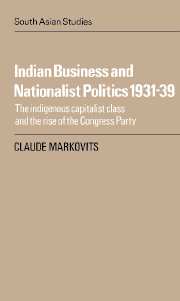 Indian Business and Nationalist Politics 1931–39
Indian Business and Nationalist Politics 1931–39 Book contents
- Frontmatter
- Contents
- Preface
- Abbreviations
- Introduction
- 1 Indian capital
- 2 Crisis and opportunities
- 3 Business, Civil Disobedience and the reforms 1931–1935
- 4 The turning point: capitalists and Congressmen 1935–1937
- 5 Business, the central government and the Congress 1937–1939
- 6 Indian business and the Congress provincial governments 1937–1939
- Conclusion
- APPENDICES
- Biographical notes
- Bibliography
- Glossary
- Index
4 - The turning point: capitalists and Congressmen 1935–1937
Published online by Cambridge University Press: 25 October 2009
- Frontmatter
- Contents
- Preface
- Abbreviations
- Introduction
- 1 Indian capital
- 2 Crisis and opportunities
- 3 Business, Civil Disobedience and the reforms 1931–1935
- 4 The turning point: capitalists and Congressmen 1935–1937
- 5 Business, the central government and the Congress 1937–1939
- 6 Indian business and the Congress provincial governments 1937–1939
- Conclusion
- APPENDICES
- Biographical notes
- Bibliography
- Glossary
- Index
Summary
The passing of the Government of India Act by the British Parliament in August 1935 opened a new phase in nationalist politics. The Congress started a gradual transformation from a movement of agitation into a parliamentary party and became a party of government in July 1937 when it formed ministries in most of the provinces of India. Indian capitalists took advantage of this ongoing transformation to forge closer links with the nationalist party. However, the process of rapprochement was slow and many obstacles remained on the road to a full-scale alliance between big business and the Congress.
Reforms Party or moderate Congress? The capitalist dilemma in 1935–1936
Although the new Constitution fell short of even the minimal demands put forward by most factions of Indian big business, businessmen saw possibilities of using some of its provisions to their own advantage. Provincial autonomy was the most promising aspect of the 1935 reforms. There was a chance that the new provincial governments would be pursuing a more active economic policy than the dyarchy governments, thus creating more opportunities for Indian business interests to expand. But what would be the political complexion of these governments? Would the Congress agree to play the game, and take part in the provincial elections that would be held after some time? What would be its performance at the polls? In case of victories, would it agree to form governments which would have to act within the framework of a constitution it rejected? By mid-1935 nobody had an answer to these questions.
- Type
- Chapter
- Information
- Indian Business and Nationalist Politics 1931–39The Indigenous Capitalist Class and the Rise of the Congress Party, pp. 101 - 127Publisher: Cambridge University PressPrint publication year: 1985


